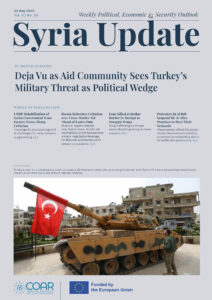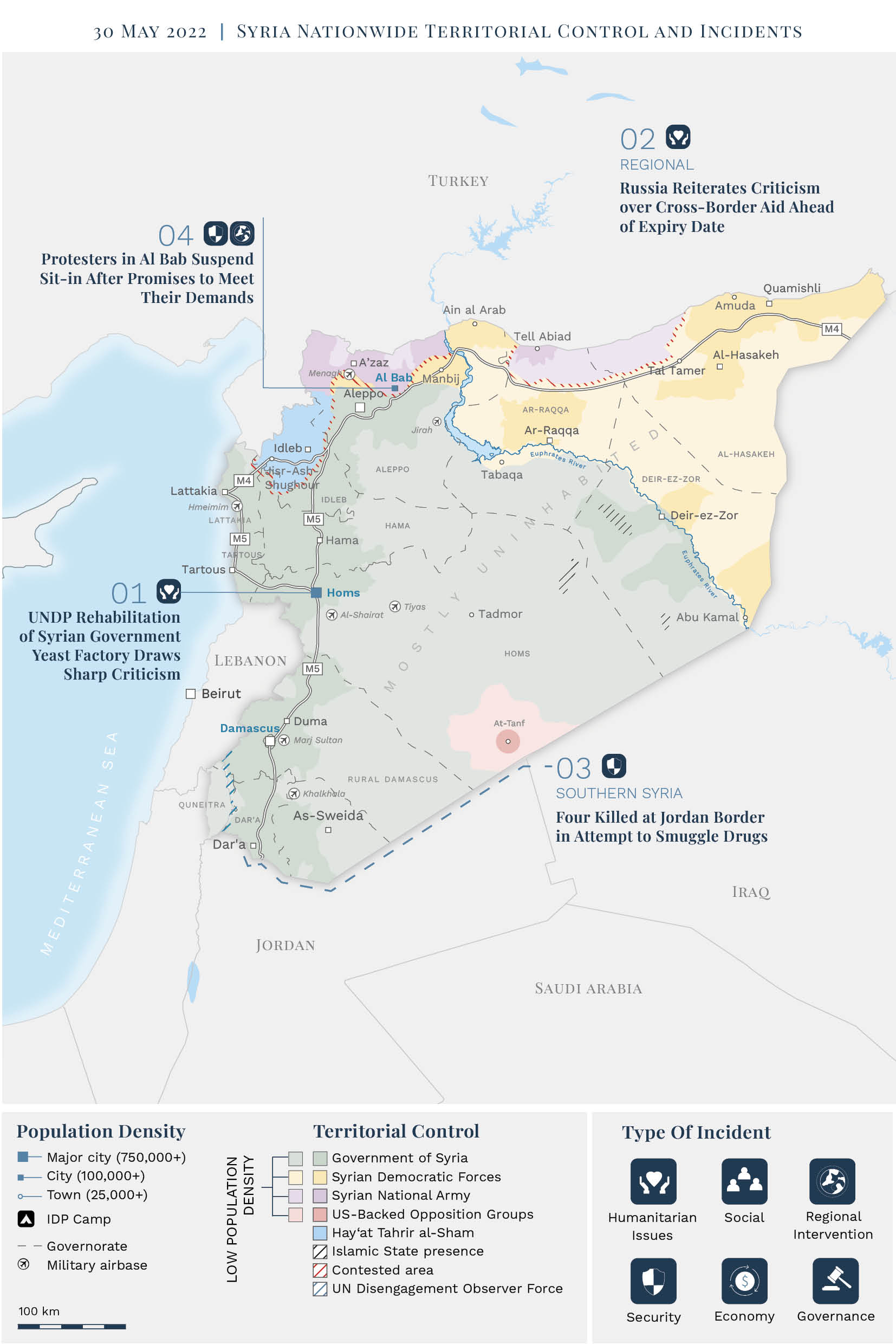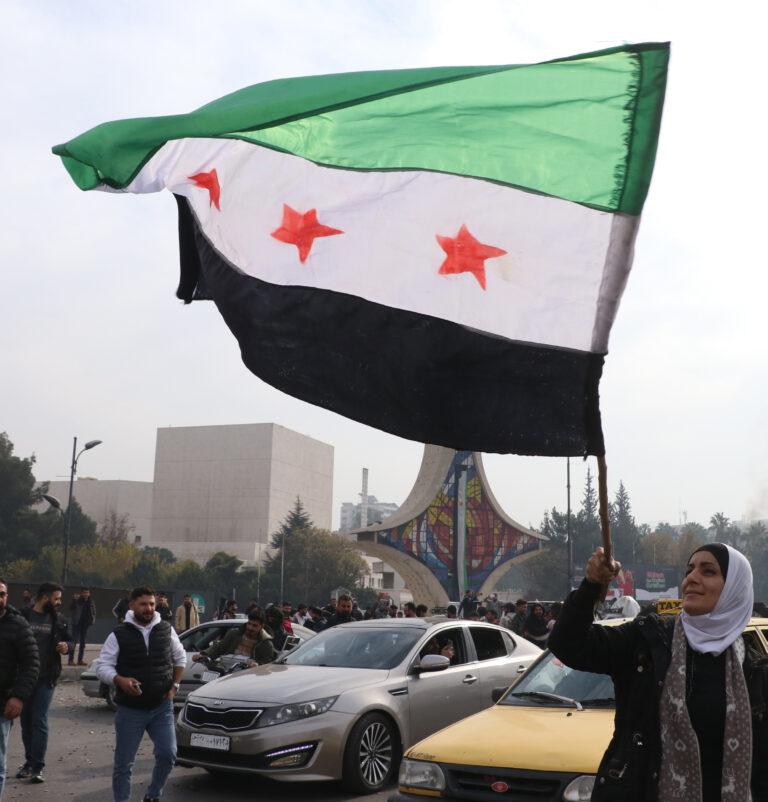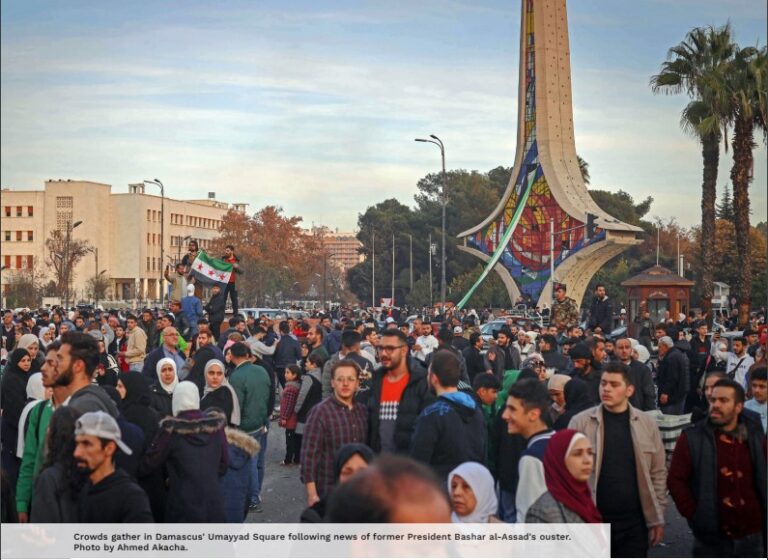Syria Update Digest
On 23 May, Turkish President Recep Tayyip Erdogan stated that his country would soon launch a new military operation into northern Syria to combat “the terrorism threat” along Turkey’s southern borders. The operation will resume Turkey’s effort to create 30-kilometre-deep safe zones along its border with Syria. While limited details have been provided regarding the scope and nature of the operation, Erdogan noted that it will mainly target areas “that are centres of attacks to our country and safe zones,” in reference to areas under the control of the Syrian Democratic Forces. While Turkey has long declared a willingness to launch a fourth military operation into northern Syria, the timing of the new plan seems to be driven by multiple domestic and international political considerations as well as what Ankara perceives as an opportune moment to boldly pursue its regional interest.
- A United Nations Development Programme (UNDP) project to rehabilitate a yeast factory in Homs has drawn sharp criticism as favouring the Government of Syria. Such criticisms reflect unresolved accountability and political efforts and point to the need for conflict-sensitive approaches to project selection.
- On 21 May, the Russian deputy UN ambassador reiterated criticism of the UN’s cross-border mechanism as a violation of Syria’s sovereignty and territorial integrity. Russia’s position regarding the mechanism is one of strategic ambiguity; there may be a rocky road ahead.
- On 22 April, Jordanian armed forces announced they had killed four smugglers in drug-related clashes at the Syrian border. Jordanian officials have become increasingly vocal about the issue, accusing “undisciplined Syrian forces” of supporting drug trafficking.
- On 23 May, protesters suspended a sit-in outside the military police headquarters in opposition-held Al Bab in Aleppo Governorate, where they had protested against the release of a man charged with murder and rape during his military service with the Syrian Arab Army. While small in scale, the events are an important demonstration of the practical challenges of pursuing accountability in Syria.

In-Depth Analysis
On 23 May, Turkish President Recep Tayyip Erdogan stated in a televised address that Turkey would soon launch a new military operation in northern Syria to combat “the terrorism threat” along Turkey’s southern border. “We will soon take new steps regarding the incomplete portions of the project we started on the 30-kilometre-deep safe zone,” Erdogan said, in reference to a project to create a zone of direct Turkish military influence in northern Syria as a buffer against forces seen by Ankara as a national security threat. Erdogan stated that the operation will target areas “that are centres of attacks to our country and safe zones,” likely indicating regions under the control of the predominantly Kurdish Syrian Democratic Forces (SDF), although the location of any potential offensive has not been articulated, despite a non-committal communique by the Turkish National Security Council emphasising the counter-terror aspects of the possible offensive.
News of the possible offensive has left the international community and aid implementers in Syria dumbstruck as they parse Erdogan’s statements to assess how credible the threat is. While this is no easy task, the announcement is distinguished from past threats by the apparent intensification of Turkey’s frustration at Western allies in recent weeks. Without doubt, Turkey’s posture is influenced by well-worn concerns that include domestic pique over refugees, economic turbulence, and next year’s elections, yet new issues have also driven its rising frustration. These include NATO expansion, which Turkey has staunchly resisted, and the recent issuance of General Licences that Ankara sees as supporting a hostile Kurdish statelet in northeast Syria (see: Syria Update 16 May 2022). At the time of writing, it remains unclear how seriously the threat of military operations should be seen, particularly given the wide margin of ambiguity, international resistance, and the lack of follow-through on similar threats made late last year (see: Syria Update 19 October 2021). Nonetheless, the evolving geopolitical context gives Ankara ample incentive to threaten such a high-risk gambit, and aid actors should be aware of the possibility that Turkey will exploit distraction and division over other regional issues to press its advantage in Syria.
Between the anvil and the hammer
Implicitly, the announcement of a new military operation has been linked to a bundle of concerns that reflect Turkish domestic politics, including rancorous national dialogue concerning refugees and their supposed relationship to the slumping Turkish economy (and steadily depreciating currency). Mindful of parliamentary and presidential elections slated for June 2023 and its own decreasing popularity amid the economic crisis, the ruling Justice and Development Party (AKP) is hard-pressed to placate voters. In the past month Turkish officials have articulated Ankara’s ongoing initiatives to repatriate 1.5 million Syrian refugees to so-called safe zones in northern Syria as soon as their safety could be guaranteed (see: Syria Update 3 May 2022). Critically, however, although the Turkish government faces pressure from resolutely anti-refugee opposition parties that seek to curry favour with the Turkish electorate by vowing more decisive action on refugees, Erdogan has emphasised that Turkey will “not expel” Syrians. Nonetheless, a military incursion into Syria would likely boost the AKP’s popularity, show decisive progress on its repatriation pledges, and connect with constituents by adopting a more aggressive posture in dealing with the Syrian Kurdish People’s Protection Units (YPG), the backbone of the SDF in Syria.
Turkish national security and strategic planners have ample reason to advocate for another offensive into northern Syria, yet their willingness to act on their ambitions is circumscribed by the country’s international partners, the US and Russia, which Turkey can ill-afford to isolate. Both countries are thought to have squelched Turkish plans for a similar incursion in late 2021. Following its Peace Spring operation in October 2019, Ankara reached separate agreements with Washington and Moscow by which the latter committed to facilitating the removal of YPG elements and their weapons to a depth of 30 kilometres from the border in return for halting the Turkish operation (see: Syria Update 9-15 October 2019). Since then, Turkey has pinned blame on the two countries for not fulfilling their commitments and blocking its attempts to achieve those objectives itself.
Never let a crisis go to waste
While little has changed in terms of their view toward Turkish military operations in Syria, both the US and Russia find themselves in awkward positions vis-à-vis Turkey. The Ukraine war has divided Moscow’s attention, while Russia finds itself somewhat humbled as it woos Turkey, which supplies Ukrainian forces with arms and by international convention controls Black Sea access. For its part, the US’s relentless efforts to enfeeble Russia geopolitically have jeopardised relations with Turkey. Supporting NATO membership bids by Sweden and Finland — which require the approval of all NATO members, including Turkey — gives Turkey leverage over its NATO allies. Nearly all the “concrete steps” demanded by Turkey as conditions for its assent to NATO expansion relate to its claims that the Nordic countries provide political, monetary, and military support to the Kurdistan Workers’ Party (PKK), an ideological bedfellow of the YPG. It has also demanded the extradition of dozens of Kurdish suspects over alleged links to terrorism and the lifting of an embargo on Turkish arms exports.
The NATO row could hardly be more ill-timed. It follows shortly after the release of new US General Licences which clarify broad sanctions relief for private sector activity in most areas of Syria that are outside Government control, with the exception of Afrin and Idleb. Although nearly all the areas of Syria that are under Turkish control will enjoy the relief brought by the measures, Turkey likely views the measures as steps that will, in effect, entrench Kurdish actors in northeast Syria that it views as a chief national security threat.
Deja vu, again
Ultimately, Turkey’s willingness to launch yet another military offensive in northern Syria likely hinges on multiple factors that, at root, have little to do with Syria. Although the US has warned Turkey against a new Syria offensive, Washington’s keenness to enlarge NATO will require concessions. One such option may be the lifting of its ban on selling F-16 jets to Turkey. Ankara’s demands with respect to the Nordic countries are likely to be harder to swallow, as is its desire for a green light to launch a new offensive in Syria. Developments in these areas may influence Turkey’s willingness to act, even without the approval of its partners.
There are currently no clear indicators that Turkey is making concrete steps or enacting military preparations for such an offensive in Syria. Long accustomed to seeing such threats wielded as political wedges, aid actors will be understandably sceptical of Ankara’s intentions. Nonetheless, it is important to recall that Turkey has repeatedly shown its willingness to take unilateral military action in Syria, particularly amid periods of distraction and disunity within the international community. Beyond advocacy, the aid community in Syria must take preparedness steps that acknowledge the devastating humanitarian impact of any new Turkish incursion in northern Syria. Most importantly, efforts should be made to monitor troop movements, heightened shelling in border communities, or other leading indicators suggesting where such an offensive would be waged. Pre-positioning must follow. As with the Operation Peace Spring, any new offensive would entail large-scale elastic displacement in border communities and areas surrounding the immediate invasion zone. Any communities that shift control would see long-term, likely permanent displacement of predominantly Kurdish populations. Finally, efforts should be taken to minimise the impact on strategic international priorities, such as the battle against Islamic State (IS) cells. Such an event would disrupt regional stability and force the SDF to divert assets from ongoing counter-terror priorities to do battle with Turkish Armed Forces or their local proxies, the Syrian National Army. For the international community, this would be a worrying outcome that appears, for now, avoidable.
Whole of Syria Review

UNDP Rehabilitation of Syrian Government Yeast Factory Draws Sharp Criticism
On 25 May the Syrian Arab News Agency reported that rehabilitation work has begun to increase soft yeast production at the state-owned Homs Sugar Factory. The project, reportedly costing 1 million USD, is being carried out with the support of UNDP, through a private firm, al-Diri Company. The project is expected to be completed within six months and reportedly encompasses work on the mechanical and electrical systems, as well as the mechanisms for cutting and packaging yeast. The factory is reportedly the only one of its kind in operation in Homs, and its outputs are said to supply Hama, Tartous, and Lattakia governorates.
Reaping more than they sow?
The sharp public criticism engendered by the project is to be expected, given the unresolved status of accountability initiatives focusing on the Government of Syria’s wartime conduct and the country’s seemingly hopelessly stalled political transition. In that context, state ownership of the facility receiving considerable UN assistance raises concern over the independence of at-scale aid delivery in Syria. While such concerns are of foremost importance given the risks of aid diversion, politicisation, and elite capture of outputs for implementation in Government-held areas, it is important to grapple with the limitations of conventional mitigations and the consequences of inaction, particularly amid Syria’s acute, and worsening, food crisis. Although private sector substitutes are often suggested, even with UN support the private sector is likely incapable of offering at-scale alternatives to the state for vital services of this type, particularly given the state’s track record of impeding service alternatives that threaten its own dominance in strategic or lucrative sectors, which are often the basis of its implicit governing pact with citizens (subjects which COAR has analysed extensively, see: Beyond Checkpoints: Local Economic Gaps and the Political Economy of Syria’s Business Community and ‘Arrested Development’: Rethinking Local Development in Syria). Fully isolating the Syrian Government from project-level coordination will prove impossible in an early recovery phase, as it has in previous stages of the crisis, but deliberate project design and thoughtful safeguards can mitigate the most pertinent risks. In particular, donor agencies and aid implementers must remain vigilant concerning Syrian Government attempts to steer the aid agenda and dictate implementation priorities. In the long term, it may also be necessary to recognise that in some areas, including matters related to food security, the interests of the foreign donor community and those of Damascus may, however tenuously and temporarily, align.
Russia Reiterates Criticism over Cross-Border Aid Ahead of Expiry Date
On 21 May, the Russian deputy UN ambassador, Dmitry Polyansky, reiterated Russia’s criticism of the UN’s cross-border mechanism on the grounds that it violates Syria’s sovereignty and territorial integrity. The deputy ambassador’s statements come a few weeks before the expiration of the UN Security Council’s Resolution 2585 on cross-border aid delivery in Syria through Bab al-Hawa, reached in July 2021 and extended in January 2022 (see: Syria Update 17 January 2022). The statements were tied to Russia’s dissatisfaction with the West and UN’s insufficient efforts to advance early recovery projects and improve the cross-line mechanism. Polyansky also stated that Russia will not “turn a blind eye” to Hay’at Tahrir al-Sham (HTS), the dominant opposition armed group in Idleb, “usurp[ing] the authority” of the state, accusing the group of prohibiting the delivery of cross-line aid from Damascus to its territories in northwest Syria. Notably, four cross-line aid convoys have entered HTS-controlled Idleb since July 2021. This issue is likely to be discussed during the upcoming talks in Nur-Sultan, Kazakhstan, which will include representatives of Russia, Turkey, Iran, the Government of Syria, and the opposition delegations.
Out for concessions?
Russia’s position regarding the cross-border mechanism has long been one of strategic ambiguity: it professes to support humanitarian aid, but also threatens to cut a major lifeline unless its conditions are met. This is indeed what happened during the extensive negotiations preceding the adoption of United Nations Security Council Resolution 2585 last year, where Russia succeeded in codifying Western support for early recovery projects in Government-held territories, a textual concession that, more than anything, merely locked in place a set of programming approaches long favoured by key donors, including the US. However, current negotiations over the cross-border mechanism are imperilled by the collapse of communications channels between Moscow and Washington, the principals responsible for the last round of cross-border talks. In addition, the issue may be further entangled with broader negotiations as Russia seeks to extract Western concessions in Ukraine. Polyansky voiced Russia’s deep opposition to the status quo and its preferences for tangible results in advancing early recovery projects and cross-line access. The time to negotiate renewal is limited, and it is not clear that preparations have proceeded at pace to make way for alternate aid mechanisms, should Moscow decide to pull the plug on the current mechanism.
Four Killed at Jordan Border in Attempt to Smuggle Drugs
On 22 May, the Jordanian armed forces announced they had killed four smugglers attempting to transport drugs to Jordan, and forced others to retreat into Syrian territory. The shipment, seized on Jordan’s northern border with Syria, contained over 637,000 Captagon pills and a significant quantity of hashish, according to the Jordanian armed forces. Relatedly, on 24 May, the Jordanian army said that Iran-linked groups were ramping up their drug smuggling activities along the border with Jordan, threatening the country’s national security. This comes amid Jordan’s concern over the broader status of southern Syria, speculation that was stoked after Jordanian King Abdullah II expressed concern that any vacuum left by Russian repositioning could be filled by Iran-backed militias.
Border trouble
Jordan’s recent statements reflect the kingdom’s enduring and increasing concern over the security of its northern border with Syria. Drug smuggling across the Jordanian-Syrian border has ticked up since 2019, and 2021 seizures outpace the whole of 2020 (see: The Syrian Economy at war: Captagon, Hashish, and the Syrian Narco-State). Jordanian officials have recently become more vocal about the issue as they level criticism as Syrian Government counterparts, accusing “undisciplined Syrian forces” of supporting drug trafficking into Jordan. Fundamentally, Amman’s efforts to bring Syria from the cold hinge on Damascus’s willingness and ability to control its borders. Another issue of concern for Jordan is the alleged Russian withdrawal from the south, which has been perceived as a harbinger of an increased Iranian presence across its borders that will lead to future escalation. It is important to note that no such drawdown has yet been noted, while in more general terms, Russia’s role in the post-reconciliation south has always been partially predicated on empowering the Syrian Government’s grip while undermining the influence of the Syrian opposition and Iran, a policy that has long served the interests of regional players, namely Jordan and Israel. Whether Moscow will change course in the future remains to be seen. Nevertheless, such change would fundamentally alter that equation, and it may disrupt regional stability. Aid actors should be vigilant with a possible absolute change in the balance of regional and local forces in the south.
Protesters in Al Bab Suspend Sit-in After Promises to Meet Their Demands
On 23 May, media sources reported that protesters suspended a sit-in outside the military police headquarters in opposition-held Al Bab in Aleppo Governorate, following the dismissal of the head of the Military Police branch in the city, Abdul Latif Khaled al-Ahmad. The sit-in began on 19 May, in protest against the release of a man charged with murder and rape during his military service with the Syrian Arab Army, who protesters alleged bribed his way to release. The Ministry of Defence in the Syrian Interim Government (SIG) announced the dismissal of al-Ahmad, who was responsible for releasing the charged man.
Justice deferred?
The events are small in scale, but they are an important demonstration of the practical challenges of pursuing accountability in Syria. Although the officer’s dismissal quelled popular unrest, outcry reemerged following a visit by the SIG Minister of Defence Hassan al-Hemade to Al Bab, during which he expressed his discontent towards those who leaked the story. Reportedly, al-Hemade told the protesters that it is not his job to respond to all the demands in the region, thus escalating a scandal over accountability and corruption into an issue of basic good governance. The minister’s stance led protesters to reassert their demands and demand an apology. Tension in the area has been compounded by the lack of security due to seemingly constant infighting between the factions of the Syrian National Army supported by Turkey, as well as intermittent tensions with Government of Syria and Autonomous Administration forces (see: Syria Update 7 March 2022). Aid actors should be aware of such events as many in the humanitarian community prioritise justice and accountability in their own portfolios. In some areas, prosecution is improbable, and appropriate first steps may entail efforts to encourage memorialisation and remembrance, rather than reliance on a shaky legal system to generate prosecutions.
Key Readings
The Open Source Annex highlights key media reports, research, and primary documents that are not examined in the Syria Update. For a continuously updated collection of such records, searchable by geography, theme, and conflict actor, and curated to meet the needs of decision-makers, please see COAR’s comprehensive online search platform, Alexandrina, at the link below..
Note: These records are solely the responsibility of their creators. COAR does not necessarily endorse — or confirm — the viewpoints expressed by these sources.
Can Assad’s New Military Appointments Help Rebuild His Regime?
What does it say? Speculation abounds over President Bashar al-Assad’s appointment of two officers to senior military positions: Lieutenant General Ali Mahmoud Abbas as the new Syrian Defence Minister, and Major General Abdelkarim Ibrahim as Chief of Staff (the first time the position has been filled in four years).
Reading between the lines: As the article points out, some combination of political motivations around sectarian balancing in the upper echelons of the military on the one hand, and an effort to take advantage of an extended lull in conflict since 2020 on the other, likely drive these moves. However, any assessment is ultimately speculative given the opacity of the al-Assad regime and the Syrian military.
Red Cross president says end ‘life in limbo’ for Syria’s Al Hol camp children
What does it say? International Committee of the Red Cross President Peter Maurer has called on the international community to remedy the plight of the 22,000 associated with Islamic State families living at al-Hol camp, noting that the situation constitutes the largest child protection crisis in the world today.
Reading between the lines: Addressing the situation of al-Hol is widely acknowledged as an urgent necessity. However, the issue is politically and legally complicated, and it is unlikely that major progress will be made in the near future.
OPINION: How drought is shifting gender dynamics in northeast Syria
What does it say? Drought in northeast Syria is disrupting traditional agriculture-based livelihoods and driving increasing numbers of women into traditionally male-dominated sectors to support their families, creating new stresses and challenges as well as new opportunities to shift gender norms.
Reading between the lines: Drought is likely to compound the deepening economic crisis in Syria and the region, driving both instability and social change.
An urgent call to end the siege on Rukban camp
What does it say? The Syria Response Coordination Group (SRCG) has called for an end to the Government of Syria’s siege on Rukban camp (near the Jordanian border). The Government blocked the road leading to the camp several weeks ago, plunging the camp into a dire humanitarian situation.
Reading between the lines: It is unlikely that the SRCG’s call for action will have a significant effect on the situation at Rukban. A crisis situation has been unfolding there for months and the Syrian Government appears committed to displacing the camp’s residents to areas under its control.
Syrian opposition protests against YPG/PKK’ ‘census’
What does it say? The head of the SIG, Abdurrahman Mustafa, denounced the Autonomous Administration of North and East Syria’s efforts to conduct a census in regions under its control, casting aspersions on its intent and suggesting that it was at least partially meant to identify property of displaced persons that could be confiscated.
Reading between the lines: Given that the source was the pro-government Turkish outlet Daily Sabah, it is no surprise that the reporting is heavily slanted against the Autonomous Administration and the YPG. Nonetheless, concerns that the census may have negative impacts may not be unfounded (see “Northeast Syria Censuses Underway” in the COAR Weekly Update Digest of 23 May 2022).
Annual Report on the Prominent Human Rights Violations Against Syrian Refugees in Lebanon (2021)
What does it say? Syrians in Lebanon faced the overlapping threats of the escalating Lebanese economic crisis alongside increased discrimination and rights violations throughout 2021, with forced eviction constituting 955 out of 1,738 reported violations.
Reading between the lines: With the economic crisis likely to continue to deepen and calls for refugee return likely to increase in volume, the situation for Syrians in Lebanon in 2022 is unlikely to improve over its dismal state in 2021.
HNAP: Priority needs and services – Spring 2022 (restricted access; visit www.hnap.info for more)
What does it say? According to the Humanitarian Needs Assessment Program (HNAP), which surveyed households throughout Syria at the beginning of 2022, food and fuel top the list of humanitarian needs throughout the country, while preferred modalities for assistance included cash, in-kind, and job creation depending on the category.
Reading between the lines: Amid worsening economic straits and with the question of the UN cross-border mechanism coming up in July, the humanitarian situation in Syria is characterised by instability and may see a worsening of needs in the second half of 2022.





